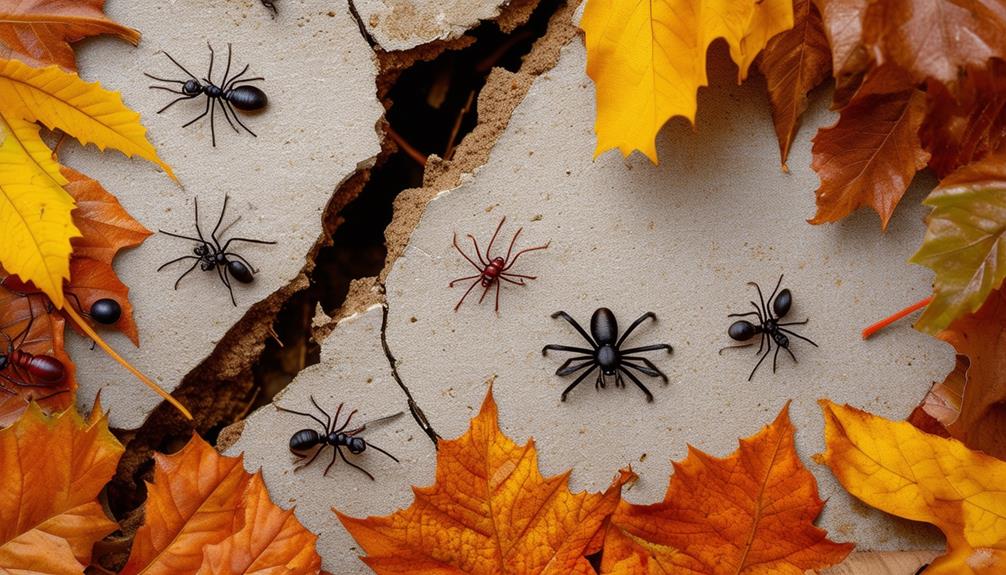As the seasons change, so do the pests that may come knocking at your door. From ants in the spring to mosquitoes in the summer, being prepared is key to safeguarding your home. But how can you stay one step ahead of these seasonal invaders? By implementing strategic measures and understanding the habits of these pests, you can create a defense plan that keeps your living space pest-free year-round. So, are you ready to tackle seasonal pests head-on and guarantee a harmonious coexistence between you and nature’s unwanted guests?
Key Takeaways
- Seal cracks and openings to prevent pest entry.
- Implement outdoor pest control measures.
- Manage mosquito populations to reduce breeding.
- Install screens to keep flying pests out.
- Eliminate standing water to limit breeding sites.
Spring Pest Preparation
When preparing for seasonal pests in spring, sealing cracks and openings to keep out ants, termites, and mosquitoes is vital. Spring brings warmer weather, which not only signals the return of blooming flowers but also the emergence of various pests seeking shelter and food in your home. By taking proactive measures to seal off entry points, you can greatly reduce the chances of these unwanted visitors infiltrating your living space.
In addition to sealing cracks, it’s essential to trim trees and shrubs around your home regularly. This simple task limits the access pests have to your house, decreasing the likelihood of infestations in the spring months. Furthermore, clearing gutters and eliminating any standing water can help prevent mosquito breeding, a common issue during this time of year.
Summer Pest Prevention
When combating summer pests, bug-proofing your home is essential to keep unwanted intruders at bay.
Implementing outdoor pest control measures can help create a barrier against insects trying to infiltrate your living spaces.
Managing mosquito populations is vital to prevent the spread of diseases they may carry.
Bug-Proofing Your Home
To effectively bug-proof your home during the summer months, consider installing window and door screens to keep flying pests out. Other preventive measures include eliminating standing water to reduce mosquito and fly breeding sites, using insect repellents during outdoor activities, and regularly trimming trees and shrubs to limit pest access. Key summer pests like mosquitoes, ticks, flies, and wasps can be kept at bay by implementing these control methods. Here’s a table summarizing some essential bug-proofing tips:
| Bug-Proofing Tips | Description |
|---|---|
| Install screens | Keep flying pests outside |
| Remove standing water | Reduce mosquito and fly breeding sites |
| Trim trees and shrubs | Limit pest access near your home |
Outdoor Pest Control
To effectively manage outdoor pest control during the summer months, prioritize measures that prevent pests from entering your home and reduce their habitats in your yard. Use window and door screens to keep out flying pests like mosquitoes.
Eliminate standing water in your yard to decrease mosquito breeding sites and lower the risk of mosquito-borne diseases. Regularly trimming trees and shrubs can limit access points for ants and spiders.
When outdoors, consider using insect repellents or insect-proof clothing to deter pests such as ticks and mosquitoes. Proper waste management is essential to prevent attracting flies and wasps during the summer.
Managing Mosquito Populations
Getting rid of standing water in your yard is important for reducing mosquito populations and minimizing the risk of mosquito-borne diseases during the summer months. Mosquitoes lay their eggs in standing water, so it’s essential to eliminate breeding sites like buckets and birdbaths.
Using insect repellents containing DEET or picaridin can effectively protect you from mosquito bites, especially during their peak activity times at dawn and dusk. Additionally, installing screens on windows and doors can prevent mosquitoes from entering your home.
To further control mosquito populations, consider using mosquito traps and larvicides around your property. By following these preventive measures and being aware of peak mosquito activity times, you can reduce the presence of mosquitoes and potential bites.
Fall Pest Readiness
As fall approaches, it’s important to prepare your home for potential pest invasions. Rodents and spiders often make their way indoors seeking warmth and shelter during the cooler months.
To prevent infestations, focus on pest-proofing your home, eliminating food sources, and conducting regular inspections.
Pest-Proofing for Fall
Prepare your home for the fall season by implementing pest-proofing measures to keep unwanted guests like rodents, spiders, and cockroaches at bay. Seal cracks and openings around the foundation, windows, and doors to prevent fall pests from entering.
Store food in sealed containers and maintain cleanliness to deter rodents and cockroaches seeking shelter indoors. Inspect and seal entry points around utility pipes and vents to keep out spiders and other pests.
To discourage rodent nesting as the weather cools, keep firewood stored away from the house. Fall is an important time for proactive pest-proofing, as these measures can help you avoid potential infestations and maintain a pest-free home during the autumn months.
Common Fall Invaders
When considering the readiness for fall pests, it’s essential to understand the behaviors and characteristics of common invaders during this season. Cockroaches are known to migrate indoors in fall seeking shelter and warmth, posing health risks and contamination.
Spiders also seek indoor shelter in fall to find food and mates, leading to increased indoor sightings. Rodents are another common fall invader, migrating indoors for warmth, food, and water, potentially causing infestations if not controlled.
With rodents come fleas, which thrive indoors during fall, necessitating effective pest control measures to prevent their spread. Being aware of these common fall invaders like cockroaches, spiders, rodents, and fleas can help you prepare and implement proactive pest control strategies for a pest-free season.
Seasonal Pest Control
Upon the arrival of fall, your focus should shift towards fortifying your home against potential seasonal pests, ensuring a pest-free environment as the weather cools down. To effectively control pests in fall, consider the following:
- Seal entry points: Rodents and spiders seek shelter indoors during fall, so sealing cracks and gaps in your home’s exterior can prevent their entry.
- Remove food sources: Eliminate any food attractants that might draw pests inside, keeping your space less inviting for infestations.
- Schedule professional pest control services: Seeking assistance from professionals can help in preparing your home for winter by addressing any existing infestations and implementing preventive measures.
Understanding the behavior of fall pests and taking proactive steps can contribute to a pest-free environment during the seasonal switch.
Winter Pest Protection
As winter sets in, taking proactive measures against pests becomes essential to safeguard your home from potential infestations. Rodents, seeking warmth and food sources, often invade homes during the colder months, posing health risks to your household. Additionally, Oriental and German roaches remain active in winter, necessitating control measures to prevent infestations. Bed bug populations tend to flourish in winter due to the indoor warmth, making it vital to be vigilant and implement prevention strategies. Different pests thrive in different seasons, highlighting the importance of tailored pest control approaches for effective management. Using a universal pest control method may not suffice year-round due to the variations in seasonal pest behaviors.
| Winter Pest Protection Tips | Benefits |
|---|---|
| Seal cracks and crevices to prevent rodent entry | Minimize health risks and property damage |
| Store firewood away from the house | Reduce shelter for pests near your home |
| Keep the kitchen clean and free of crumbs | Eliminate food sources for roaches and rodents |
| Inspect and vacuum mattresses regularly | Prevent bed bug infestations and promote better sleep |
Understanding Seasonal Pest Behavior
To comprehend seasonal pest behavior thoroughly, it’s imperative to recognize the distinct patterns and tendencies exhibited by various pests throughout the year. Understanding how pest behavior is influenced by seasonal changes can help you anticipate and address potential infestations effectively.
- Life Cycles: Different pests go through specific stages of development throughout the year, impacting their behavior and activity levels.
- Seasonal Changes: Variations in weather conditions and food availability play a significant role in determining when certain pests are most active.
- Regular Inspections: Conducting routine inspections of your property allows you to detect pest issues early on and implement control measures promptly.
Effective Pest Control Measures
Effective pest control measures involve a strategic combination of proactive prevention tactics and targeted intervention strategies to manage and eliminate pest infestations efficiently. Common summer pests are often active during spring as they emerge in search of warmth and food sources.
Understanding the pests’ life cycles is essential in implementing effective control measures. Regular inspections and cleanliness play an important role in preventing infestations year-round. By sealing entry points and removing potential food sources, you can greatly reduce the risk of pests entering your home.
Utilizing a mix of physical, chemical, and biological control methods can help maintain a pest-free environment. Implementing preventive measures is key to successful pest control; it’s crucial to address any signs of infestation promptly.
Professional pest control services can provide tailored solutions and expertise to tackle seasonal pest challenges effectively. By staying vigilant and taking proactive steps, you can keep your home pest-free throughout the year.
Collaborating With Pest Control Professionals
When dealing with pest issues that require specialized knowledge and expertise, collaborating with pest control professionals becomes a valuable resource in effectively managing and resolving infestations. These experts are equipped with the necessary training and tools to address various pest problems.
Here are some reasons why working with pest control professionals is beneficial:
- Specialized Expertise: Pest control professionals have in-depth knowledge of seasonal pest control and can offer customized solutions for your specific needs.
- Effective Pest Control Methods: They employ advanced pest control methods that are more efficient in eradicating common pests.
- Preventive Measures: Professionals can recommend preventive strategies to keep pests like mosquitoes at bay and protect your home from infestations.
Frequently Asked Questions
Are Pests Seasonal?
You’ll find that pest behavior aligns with seasonal trends. Weather impacts influence their movement. Prevention techniques help manage infestation patterns. Understanding when pests are most active each season guides your control strategies effectively for a pest-free environment.
Which Season Is Best for Pest Control?
Summer treatments are essential for combating mosquitoes, flies, and ticks. Winter prevention focuses on sealing entry points to keep out rodents. Spring infestations require early identification of pests, while fall extermination tackles indoor pests like spiders. Year-round protection is crucial.
Which Pest Causes the Most Damage to Property Each Year?
You may be surprised to learn that termites, those tiny insects, cause the most property damage each year. Their penchant for wood and cellulose materials can compromise your home’s structure without you even knowing.
How Many Times a Year Should You Hire Pest Control?
You should Hire pest control at least once a year for pest prevention. Regular inspections and pest maintenance are key for year-round protection. Depending on your needs, quarterly treatments may be needed for effective pest treatment.




